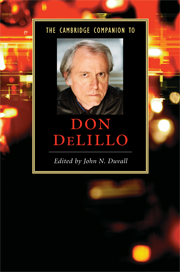Book contents
- Frontmatter
- Introduction: The power of history and the persistence of mystery
- PART I AESTHETIC AND CULTURAL INFLUENCES
- PART II EARLY FICTION
- PART III MAJOR NOVELS
- PART IV THEMES AND ISSUES
- Conclusion: Writing amid the ruins: 9/11 and Cosmopolis
- Select bibliography
- Guide to further reading
- Index
- Series List
Introduction: The power of history and the persistence of mystery
Published online by Cambridge University Press: 28 June 2008
- Frontmatter
- Introduction: The power of history and the persistence of mystery
- PART I AESTHETIC AND CULTURAL INFLUENCES
- PART II EARLY FICTION
- PART III MAJOR NOVELS
- PART IV THEMES AND ISSUES
- Conclusion: Writing amid the ruins: 9/11 and Cosmopolis
- Select bibliography
- Guide to further reading
- Index
- Series List
Summary
Since the 1985 publication of White Noise, winner of the National Book Award, Don DeLillo has become one of the most significant contemporary American novelists, standing in the first rank with Thomas Pynchon, Toni Morrison, Philip Roth, and John Updike. In a 2005 poll conducted by the New York Times Book Review that asked 125 prominent writers and critics to name the best American novel of the past 25 years, three of DeLillo's novels ranked in the top twenty: Underworld (1997) (runner-up to Toni Morrison's 1987 Beloved), White Noise, and Libra (1988).
The recognition of DeLillo's achievement has not been limited to America. In 1999 DeLillo received the Jerusalem Prize at the Jerusalem International Book Fair. The award, given every two years since 1963, honors a writer whose body of work expresses the theme of the individual's freedom in society. The first American recipient of the award, DeLillo joined an international group of previous winners that includes such distinguished novelists, playwrights, and philosophers as Bertrand Russell, Simone de Beauvoir, Jorge Luis Borges, Eugene Ionesco, V. S. Naipaul, Milan Kundera, and Mario Vargas Llosa. In selecting DeLillo, the jury characterized his work as “an unrelenting struggle against even the most sophisticated forms of repression of individual and public freedom during the last half century.”
The author of fourteen novels, DeLillo has become a fixture on college course syllabi and is often selected to represent the American postmodern novel in undergraduate literature surveys. Given DeLillo's undeniable significance to contemporary American fiction, this volume seeks to provide the reader with an overview of DeLillo's achievement as a novelist, taking up the author's poetics and themes, as well as providing more in-depth coverage of his best-known and most frequently taught novels.
- Type
- Chapter
- Information
- The Cambridge Companion to Don DeLillo , pp. 1 - 10Publisher: Cambridge University PressPrint publication year: 2008
- 5
- Cited by



